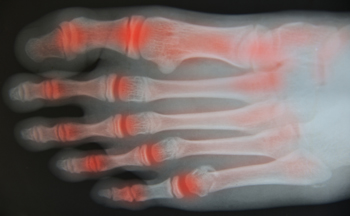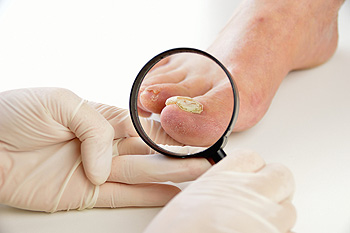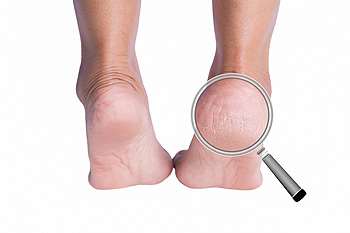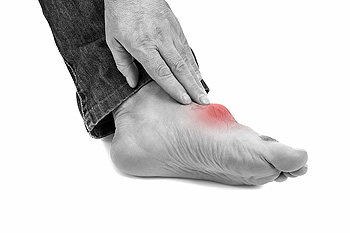Items filtered by date: October 2020
What Are the Symptoms of Hallux Rigidus?
 Hallux rigidus is a disorder of the joint located at the base of the big toe. This condition causes arthritic pain and stiffness in the joint. With time, the joint loses mobility, and it becomes increasingly hard to bend the toe. The pain and stiffness in the big toe may be most noticeable during walking, standing, or bending, and can lead to difficulties performing physical activities like running. The pain and stiffness may also be aggravated by cold, damp weather. As the disorder progresses, pain may become more constant, even when resting, and can cause difficulties when wearing shoes. Dull pain in the hips, knees, and lower back may develop due to changes in the way you walk, and in severe cases, you may begin to limp. If you are experiencing any of the symptoms of hallux rigidus, it is recommended that you visit a podiatrist for diagnosis and treatment.
Hallux rigidus is a disorder of the joint located at the base of the big toe. This condition causes arthritic pain and stiffness in the joint. With time, the joint loses mobility, and it becomes increasingly hard to bend the toe. The pain and stiffness in the big toe may be most noticeable during walking, standing, or bending, and can lead to difficulties performing physical activities like running. The pain and stiffness may also be aggravated by cold, damp weather. As the disorder progresses, pain may become more constant, even when resting, and can cause difficulties when wearing shoes. Dull pain in the hips, knees, and lower back may develop due to changes in the way you walk, and in severe cases, you may begin to limp. If you are experiencing any of the symptoms of hallux rigidus, it is recommended that you visit a podiatrist for diagnosis and treatment.
Arthritis can be a difficult condition to live with. If you are seeking treatment, contact Dr. Mark Gagnon from Advanced Podiatry. Our doctor can provide the care you need to keep you pain-free and on your feet.
Arthritic Foot Care
Arthritis is a joint disorder that involves the inflammation of different joints in your body, such as those in your feet. Arthritis is often caused by a degenerative joint disease and causes mild to severe pain in all affected areas. In addition to this, swelling and stiffness in the affected joints can also be a common symptom of arthritis.
In many cases, wearing ill-fitting shoes can worsen the effects and pain of arthritis. Wearing shoes that have a lower heel and extra room can help your feet feel more comfortable. In cases of rheumatoid arthritis, the arch in your foot may become problematic. Buying shoes with proper arch support that contour to your feet can help immensely.
Alleviating Arthritic Pain
- Exercises that stretch the foot can prevent further pain and injury and increase mobility
- Most of the pain can be alleviated with anti-inflammatory drugs, heat, and topical medications
- Massages can help temporarily alleviate pain.
It is best to see your doctor for the treatment that is right for your needs and symptoms. Conditions vary, and a podiatrist can help you determine the right method of care for your feet.
If you have any questions, please feel free to contact one of our offices located in Crestwood, Orland Park, and Summit, IL . We offer the newest diagnostic tools and technology to treat your foot and ankle needs.
Should I See a Doctor for Toenail Fungus?
 A fungal infection of the toenails can be unpleasant, unsightly, and sometimes even painful. It can also lead to more severe complications in people who have diabetes or poor circulation. If you have toenail fungus, you may find that you have thickened, discolored, brittle, or crumbly toenails. Additionally, the shape of your nail bed may change, and the feet may have an odor, ranging from mild to foul. These symptoms could worsen over time if left untreated. Treatments for toenail fungus can include oral medications, medicated nail polishes or creams, and in more severe cases, nail removal. If you notice that the condition of your nails is worsening, or if you have diabetes or poor circulation, it is suggested that you see a podiatrist for treatment.
A fungal infection of the toenails can be unpleasant, unsightly, and sometimes even painful. It can also lead to more severe complications in people who have diabetes or poor circulation. If you have toenail fungus, you may find that you have thickened, discolored, brittle, or crumbly toenails. Additionally, the shape of your nail bed may change, and the feet may have an odor, ranging from mild to foul. These symptoms could worsen over time if left untreated. Treatments for toenail fungus can include oral medications, medicated nail polishes or creams, and in more severe cases, nail removal. If you notice that the condition of your nails is worsening, or if you have diabetes or poor circulation, it is suggested that you see a podiatrist for treatment.
For more information about treatment, contact Dr. Mark Gagnon of Advanced Podiatry. Our doctor can provide the care you need to keep you pain-free and on your feet.
Toenail Fungus Treatment
Toenail fungus is a condition that affects many people and can be especially hard to get rid of. Fortunately, there are several methods to go about treating and avoiding it.
Antifungals & Deterrence
Oral antifungal medicine has been shown to be effective in many cases. It is important to consult with a podiatrist to determine the proper regiment for you, or potentially explore other options.
Applying foot powder on the feet and shoes helps keep the feet free of moisture and sweat.
Sandals or open toed shoes – Wearing these will allow air movement and help keep feet dry. They also expose your feet to light, which fungus cannot tolerate. Socks with moisture wicking material also help as well.
If you have any questions please feel free to contact one of our offices located in Crestwood, Orland Park, and Summit, IL . We offer the newest diagnostic tools and technology to treat your foot and ankle needs.
Quick Treatments for Dry Heels
 As the colder months approach, you may find that your heels are becoming increasingly dry and cracked. Fortunately, there are many things that can be done to help. Soaking your feet in a lukewarm oatmeal bath for about 20 minutes and then applying a moisturizer to the feet may help, as can soaking your feet in an Epsom salt bath. You can prevent dry, cracked heels by wearing appropriate footwear and protecting your feet from extremely hot or cold weather. When bathing, avoid exposing your feet to extremely hot water as well. When you wash your feet, choose a soap that doesn’t contain sodium lauryl sulfate or artificial fragrances, as these ingredients can often dry out the feet. If your dry heels persist, or if you develop deep, painful cracks, is it strongly suggested that you visit a podiatrist for treatment.
As the colder months approach, you may find that your heels are becoming increasingly dry and cracked. Fortunately, there are many things that can be done to help. Soaking your feet in a lukewarm oatmeal bath for about 20 minutes and then applying a moisturizer to the feet may help, as can soaking your feet in an Epsom salt bath. You can prevent dry, cracked heels by wearing appropriate footwear and protecting your feet from extremely hot or cold weather. When bathing, avoid exposing your feet to extremely hot water as well. When you wash your feet, choose a soap that doesn’t contain sodium lauryl sulfate or artificial fragrances, as these ingredients can often dry out the feet. If your dry heels persist, or if you develop deep, painful cracks, is it strongly suggested that you visit a podiatrist for treatment.
Cracked heels are unsightly and can cause further damage to your shoes and feet. If you have any concerns, contact Dr. Mark Gagnon from Advanced Podiatry. Our doctor can provide the care you need to keep you pain-free and on your feet.
Cracked Heels
Cracked heels appear unappealing and can make it harder for you walk around in sandals. Aside from looking unpleasant, cracked heels can also tear stockings, socks, and wear out your shoes. There are several methods to help restore a cracked heel and prevent further damage.
How Do You Get Them?
Dry skin is the number one culprit in creating cracked heels. Many athletes, walkers, joggers, and even swimmers suffer from cracked heels. Age and skin oil production play a role to getting cracked heels as well.
Promote Healing
Over the counter medicines can help, especially for those that need instant relief or who suffer from chronic dry feet.
Wear Socks – Wearing socks with medicated creams helps lock in moisture.
Moisturizers – Applying both day and night will help alleviate dryness which causes cracking.
Pumice Stones – These exfoliate and remove dead skin, which allows for smoother moisturizer application and better absorption into the skin.
Change in Diet
Eating healthy with a well-balanced diet will give the skin a fresh and radiant look. Your body responds to the kinds of food you ingest. Omega-3 fatty acids and zinc supplements can also revitalize skin tissue.
Most importantly, seek professional help if unsure how to proceed in treating cracked heels. A podiatrist will help you with any questions or information needed.
If you have any questions, please feel free to contact one of our offices located in Crestwood, Orland Park, and Summit, IL . We offer the newest diagnostic and treatment technologies for all your foot care needs.
When Gout Is Not Getting Better
Gout is a type of arthritis caused by a buildup of uric acid in the bloodstream. The uric acid deposits in the joints, usually those of the big toe, and forms crystals, which lead to pain, redness, and swelling in the joint. There are various treatments for gout, but what if none of them are working for you? There is a possibility that you may not have gout. Pseudogout, a condition that mimics gout but causes calcium crystals to build up in the joints instead of uric acid crystals, may be the real culprit. It is also possible that you may have a different type of arthritis, such as reactive arthritis, psoriatic arthritis, infectious arthritis, chronic rheumatoid arthritis, or chronic osteoarthritis. For more information about gout, conditions that might mimic it, and treatment recommendations, consult with a podiatrist.
Gout is a foot condition that requires certain treatment and care. If you are seeking treatment, contact Dr. Mark Gagnon from Advanced Podiatry. Our doctor will treat your foot and ankle needs.
What Is Gout?
Gout is a type of arthritis caused by a buildup of uric acid in the bloodstream. It often develops in the foot, especially the big toe area, although it can manifest in other parts of the body as well. Gout can make walking and standing very painful and is especially common in diabetics and the obese.
People typically get gout because of a poor diet. Genetic predisposition is also a factor. The children of parents who have had gout frequently have a chance of developing it themselves.
Gout can easily be identified by redness and inflammation of the big toe and the surrounding areas of the foot. Other symptoms include extreme fatigue, joint pain, and running high fevers. Sometimes corticosteroid drugs can be prescribed to treat gout, but the best way to combat this disease is to get more exercise and eat a better diet.
If you have any questions please feel free to contact one of our offices located in Crestwood, Orland Park, and Summit, IL . We offer the newest diagnostic and treatment technologies for all your foot and ankle needs.


